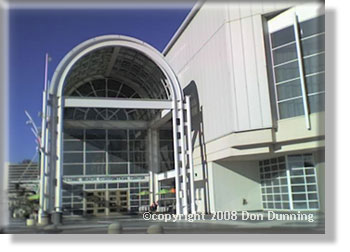Notes From California State Realtors Meeting
Originally appeared in Bay Area News Group publications on October 31st and November 2nd, 2008

Long Beach Convention Center
As a director of the California Association of Realtors (C.A.R.), I attend meetings three times a year at various locations throughout the state. This one was held in Long Beach from Oct 14th through Oct 18th with about 1200 in attendance.
Weather was great, but not much time for play. During the four-and-a-half days of meetings there were simultaneous sessions on a variety of topics intended to keep Realtors up-to-date and informed — from new laws to Multiple Listing Service (MLS) issues, from economic forecasts to consumer protection. Many of the topics related to the current foreclosure crunch. Turns out that most of the problems we discussed are more prevalent in southern California and the Central Valley but we could be seeing them in the East Bay.
Blight ordinances
A new state law allows municipalities to fine REOs (real estate owned by banks) up to $1000 per day for blight. This may include browned lawns and landscaping, trash, broken windows, etc. Many cities are using this law as a source of income. Chula Vista is fining $500 per day in addition to a $70.00 registry fee for every REO. Riverside fines $1000 a day. In one case, a bank had to pay a $100,000 fine in order to get the property closed.
Water bills
After close of escrow, water companies are surprising buyers of REOs with large, past due water bills. As the money owed is not a lien on the property, and there is no paper trail, the issue comes as a shock to the new owners. They have no choice but to pay or face not having water service.
Credit inquiries
Many potential home buyers are unknowingly having their credit score unfairly lowered through no fault of their own.
When a lender checks a buyer’s credit, or an individual applies for a credit card, and his credit history is reviewed, this is called an “inquiry.” Computer-based credit scoring programs penalize people who have too many of these.
Whether it is for a mortgage or a credit card, all credit inquiries in any one month are considered as one. The problem, however, is that many buyers are having their credit checked each time they write an offer on an REO or short sale property.
It may take numerous offers on different homes, over a period of many months, to get an accepted contract. Meanwhile, the buyer/borrower’s credit score is going down. This could lead to the person being rejected for the loan, or, if accepted, paying a higher interest rate.
Loan mitigation companies
The foreclosure crisis has spawned a cottage industry of so-called loan mitigation experts. They purport to help people behind in mortgage payments deal with their lender.
Although only a handful of companies in the state are legally authorized to charge an advance fee for their services, stressed homeowners in or near foreclosure are commonly asked to pay an up-front amount for faux services.
A Substantial number of these operations falsely advertise they are free. They turn out to be not free and not licensed.
Abandoned pets
Tragically, some people who have lost their homes leave behind one or more pets. Often, it is the Realtor marketing the property for the lender who ends up having to deal with this.
Fortunately, California has a “pet left behind law” that says local animal control must be contacted in these cases. Unfortunately, this does not guarantee the survival of the pets.
Tenant notice
A new state law mandates that tenants in foreclosed properties get a warning about the impending foreclosure three weeks beforehand. Upon foreclosure, the tenant must then receive a 60-day notice.
Foreclosure counseling/lender notice
Another new state law requires lenders to contact the borrower in person or by phone 30 days before issuing a foreclosure notice. They also must provide the borrower with a list of Housing and Urban Development (HUD) foreclosure counselors. This has slowed down California foreclosures since its implementation on September 8th.
Economic review and 2009 forecast
California:
- C.A.R. membership has slipped from 207,000 in 2007 to a forecasted 158,000 (12.2% decrease) for 2009.
- During 2005 to 2006, 40% of buyers put nothing down on their purchase.
- 5.8% of all loans in California were past due as of August 2008.
- 2008: transactions up 12%, median prices down 31.7%.
- 2009 forecast: transactions up 12.5%, median prices down 7.5%.
San Francisco region:
- Peak month, May 2007 = $853,910 median price.
- August 2008 = $619,300 median price (27.5% decrease). When considering all regions of California, this was one of the lowest decreases.
- 2009 fixed mortgage interest rates are projected at 6.2% and California unemployment at 7.5%.